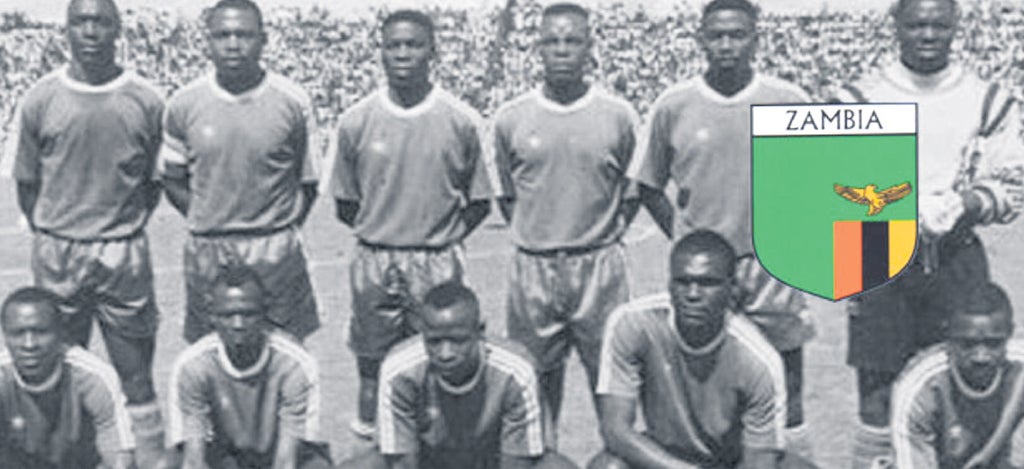The day a team died
Zambia kick off against Senegal on Saturday – for many, a fixture to bring back sad memories of the greatest team Zambia ever had, and lost. By Jonathan Wilson

At 10pm local time on Saturday, Zambia will walk out to face Senegal at the new stadium in Bata, Equatorial Guinea, in the second match of the double-header that opens this year's African Cup of Nations. While the return of their charismatic coach, Hervé Renard, has given Zambians genuine optimism again, the minds of many supporters will be cast back to 27 April 1993, when another Zambia team set off to play Senegal in a World Cup qualifier. That team, the best Zambia has ever had and potentially one of the greatest in African history, never arrived.
This will be the 10th time the sides have met since then, but what makes this game poignant is that it was just a few miles south of Bata that their plane went down, crashing into the Atlantic after refuelling in Gabon's capital, Libreville.
Zambia had blossomed at the 1988 Olympics, Kalusha Bwalya scoring a hat-trick as they thrashed a strong Italy side 4-0. It was a result that reverberated; this wasn't a 1-0 freak achieved through 89 minutes of defending and a lucky breakaway, it was a win based on complete domination.
Kalusha (Bwalya is such a common surname in Zambia that he's widely known by his first name) was the star of that side, a technically gifted and powerful forward. When he was 20, he was spotted by a Belgian scout and moved from his hometown club of Mufulira to Brugge Cercle and then, after the Olympics, to PSV Eindhoven. It was a transfer that saved his life.
A defeat away to Tunisia in their final qualifier meant Zambia missed out on the 1990 World Cup, but their football was lifted by the Olympics. Nkana Red Devils made the 1990 African Champions Cup final and Power Rangers won the 1991 African Cup-Winners' Cup. The 1980s had seen significant investment in the sport both from the government and the nationalised copper industry, spurred by the fact that the president, Kenneth Kaunda, loved football.
He ruled Zambia for 27 years, but by the late 1980s the economy was a mess. Zambia had to withdraw from hosting the 1988 African Nations Cup as funding for football began to dry up.
Travel to away games became increasingly difficult, with the national federation (FAZ) lacking the funds to charter planes. Frequently they would turn to the Zambian Air Force and ask to borrow a jet.
In 1992, Zambia won their first two games in the first World Cup qualifying phase, but then faced a trip to Madagascar. As so often, they ended up borrowing a Buffalo from the ZAF. When it took off for a five-hour trip over the Indian Ocean, the pilot insisted the players wore their life-jackets. The players joked about it, and Johnson Bwalya took some light-hearted photographs, but there was an awareness that this was not really something to joke about. "The boys," Kalusha said, "always used to say, 'This plane will kill us some day.'"
Zambia lost that game, but the team – if not its funding – recovered. Flying home on the Buffalo from a Cup of Nations qualifier from Mauritius, young forward Kelvin Mutale spoke to journalist Beauty Lupiya, telling her that even if the plane crashed they'd be safe because it would float. She told him not to be so morbid, but noticed how the plane struggled to gain altitude.
A week later, the players boarded the Buffalo again for the game against Senegal. Kalusha and Charles Musonda of Anderlecht had missed the Mauritius game and so made their own way to west Africa. En route to Dakar, it refuelled at Libreville. Gabon's transport ministry said it had routine checks and then took off again. Two minutes later it exploded, killing all five crew and 25 passengers.
Six members of the 1988 Olympic squad, including the goalkeeper Efford Chabala, died. So too did the 19-year-old Moses Chikwalakwala, Zambia's Young Player of the Year in 1992.
There were claims the plane had been shot down by the Gabonese military, mistaking it for an invasion force. Diplomatic relations between Gabon and Zambia were shattered, each trying to blame the other: eventually, in 2003, the official report was released. It was inconclusive – there was no flight recorder – but blamed an engine fault.
Kalusha became the centrepiece of a new team. Remarkably, under two Danish coaches and then the former Sunderland player Ian Porterfield, a young side rallied and reached the final of the 1994 Cup of Nations, where the Nigeria of Sunday Oliseh, Rashidi Yekini and Jay-Jay Okocha proved too strong and won 2-1. Zambia have never come as close to a major title since.
Kalusha played until his mid-30s, had a stint as coach and is now president of FAZ. "People cannot help but think about what might have been," Kalusha said. "We were a team with confidence, who wanted to reach the World Cup and were ready for it. We desperately want to achieve something still."
Subscribe to Independent Premium to bookmark this article
Want to bookmark your favourite articles and stories to read or reference later? Start your Independent Premium subscription today.

Join our commenting forum
Join thought-provoking conversations, follow other Independent readers and see their replies